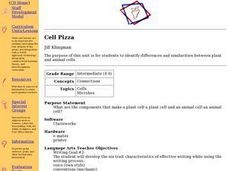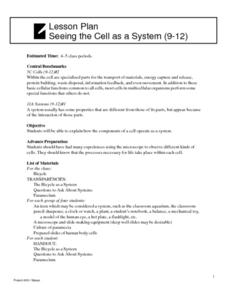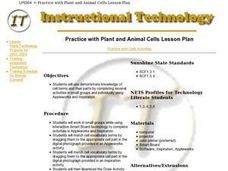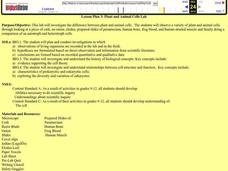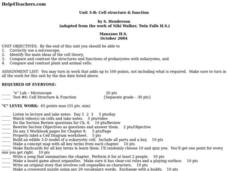Curated OER
Cells in the Making
Young scholars examine and research the parts of a cell, their functions, and life processes. They simulate how cells receive nutrients using coffee filters, water, and coffee, and construct cells using pudding, cookie dough, and candy.
Curated OER
Cell Types
Fourth graders create cartoon characters which compare and contrast two types of cells: nerve and muscle. Cartoon characters show how these two cells are similar, how they are different, and the relationship between the two cell types.
Curated OER
Edible Cells
Eighth graders construct edible models of a plant cell and an animal cell and state the functions of the organelles. They are to write a short sentence describing the function of each organelle.
Curated OER
Cells
Learners research both plant and animal cell characteristics. They draw the parts of each cell and as groups present their research.
Curated OER
Stem Cell Bioethics
Students study the steps of embryonic development. They distinguish between the advantages/disadvantages of embryonic stem cells vs. adult stem cells and discuss the ethical implications of stem cell research.
Curated OER
Cells are 3-D!
Students design three dimensional models of plant and animal cells. They identify the cells parts, and compare animal and plant cells.
Curated OER
Cell Pizza
Students identify parts and functions of microscope. Students watch video, Cells and Life about cell parts with actual pictures and actual cells. Students discuss video and identify parts of the cells that animals and plants have in...
Curated OER
Those Cells Look Good Enough to Eat
Students explore the parts of the cell. In this cell lesson, students use foods to create cell models that represent the nucleus, cytoplasm, cell membrane, mitochondria, ribosomes, vacuoles, endoplasmic reticulum, and Golgi bodies...
Curated OER
How Cells Duplicate and Why Where Something Can Go Wrong
Seventh graders explore the function of a cell and cell division. In this investigative instructional activity students construct a 3-D model of a DNA molecule.
Curated OER
Cell Campaign
Students work in groups to create a new head of the cell to take over for the nucleus. For this cell lesson students produce a campaign that will show the importance of the organelle to the cell.
Curated OER
Cell Phones and Driving
Students identify and explore the dangers of cell phone use while driving. In this car safety lesson, students research using a cell phone while driving. Students compile the information to create a presentation and write a reflection...
Curated OER
Seeing the Cell as a System
Students explain how the components of a cell operate as a system. Students examine a bicycle and find out if parts were arranged differently, could the system still be carried out. They look at cells as well and see what function they...
Curated OER
Practice with Plant and Animal Cells
Students work in small groups to match cell vocabulary terms to the appropriate cell part in a photograph. They use a draw program to sketch a plant and animal cell.
Curated OER
Cell Reproduction
In this cell reproduction worksheet, students will review the 5 phases of the cell cycle: telophase, interphase, prophase, metaphase, and anaphase. Students will use the cell cycle diagram to complete 5 short answer questions.
Curated OER
The Incredible, Edible Cell
Students discover organelles and the functions organelles perform in cells. For this biology lesson, students create model cells using Jell-o, then dissect their "cell" to examine the parts that create a cell. Students create a diagram...
Curated OER
Defining the Difference Between Prokaryotic and Eukaryotic Cells
Students examine microscopic life by conducting a scientific investigation. In this cell analysis lesson, students define the prokaryotic and eukaryotic cells and discuss their word origins. Students view each type of cell on slides...
Curated OER
Cell Cycle Portfolio
Students work together in groups to complete various stations on the cycles of cells. Individually, they keep their completed work in a folder after following specific instructions on how to complete each experiment. They use the...
Curated OER
Plant and Animal Cells
Pupils investigate the difference between plant and animal cells. They observe a variety o plant and animals cells by looking at a piece of cork, an onion, elodea, prepared slides of paramecium, human bone, frog blood, and human striated...
Curated OER
Cell Structure and Function
High schoolers identify the main ideas of different cell theories. Using a microscope, they compare and contrast the structures and functions of prokaryotes and eukaryotes. They also compare and contrast animal and plant cells and...
Curated OER
A Cell Is Like A City
Students create analogies that help them remember the cell parts as well as their respective functions.
Curated OER
Why Are Cells So Small?
Students examine the relationship between cell surface area and the ability of materials to diffuse through a cell. They participate in an experiment in which they determine which materials diffuse easier than others. They complete...
Curated OER
Cell Division and Mitosis
High schoolers identify each phase of mitosis and the main characteristics of each. Students prepare a microscope slide with onion root tip. High schoolers observe the cell division occurring in the cells and label the mitosis phases...
Curated OER
Comparing a Cell to a Factory
In this cell worksheet, students access a given website to compare the cell organelles and their functions to jobs in a factory. This worksheet is a graphic organizer.
Other popular searches
- Cell Biology
- Cell Parts
- Cellular Respiration
- Cell Organelles
- Animal Cells
- Plant and Animal Cells
- Cell Structure
- Cell Cycle
- Cell Membrane
- Cell Reproduction
- Cell Theory
- Plant Cells






